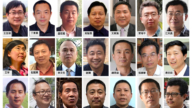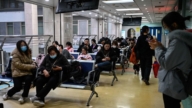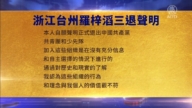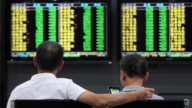【新唐人2014年02月04日訊】最近,美國媒體推出了世界各國比工資的活動。根據中共國家統計局公布的最新收入水平,中國高收入階層的工資水平與南非司機的工資水平相當,而中等收入的人均收入,僅僅相當於泰國清潔工的工資水平。那麼號稱全球第二大的經濟體,民眾收入為何如此的低,中國的財富哪裏去了?我們來看看專家的分析。
美國有線電視新聞網《CNN》網站,日前推出了與世界各國比工資的活動,只要輸入你的收入水平,就能知道你與埃塞俄比亞的老師、南非的司機、英國女王等工資的對比。
根據中共國家統計局最近公布的數據,2013年,大陸城鎮居民人均總收入為29547元,56389元人民幣屬於高收入人群,而中等收入組的人均收入為24518元,低收入組人均11434元。
有記者輸入這些數字與其他國家的收入水平做了一番比較,發現中國的高薪工資水平相當於南非司機的工資水平,是英國女王工資的五千分之一,而中等收入水平與泰國清潔工的工資水平相當,低收入組的人均收入只有泰國清潔工工資的一半,是英國女王工資的二萬分之一。
另外一份2013年全球每小時最低工資水平報告顯示,中國內地排在第17名,最低薪酬每小時只有0.8美元。在榜單中,澳大利亞以每小時16.88美元位居榜首,法國以每小時12.09美元的薪酬居第二,新西蘭以11.18美元排名第三。
中共統計數字顯示,到2010年,中國的GDP總量己經超過日本,成為世界第二大經濟體。
那麼中國的錢到哪裏去了呢?
中國金融智庫研究員鞏勝利:「一個錢去了國有企業,還一個錢,比如財政收入,中央佔大頭,省級政府佔中頭,還有縣市級政府,中央政府佔的最大,大概超過60%,還有一少部分去了所謂的富人,只佔了10%左右。」
中國金融智庫研究員鞏勝利指出,35年的改革,中國的GDP數字翻了10幾倍,老百姓的工資收入,一直沒有成比例增加,相反,稅收卻變著花樣的增加,以及天量的貨幣投放導致通貨膨脹,使得老百姓變得更窮。
據了解,2013年中國的貨幣投放量大概是2010的幾乎六倍。
大陸公民監政會發起人郭永豐:「所謂的國家也是黨的國,黨國,不是人民的國,人民只是奴隸,在這麼一個國家它怎麼會管人民的死活?一切它都是自我標榜,說我們政黨養活人民,哪一個國家的政黨敢說這樣無恥的話,你一個政黨怎麼養活人民,你勞動了嗎?你幹活了嗎?你有甚麼技術?」
儘管中國民眾的收入不及南非,中共政府還是不忘向南非捐錢,捐物和進行軍事援助,2006年6月,中共向南非政府提供了2000萬元的無償援助,用來實施人力資源培訓項目。中共還為南非農村援建了1000套住房,計劃再建400套。 去年4月,中共再次向南非投資35億美元,
郭永豐:「收買人家給它說好話,進聯合國常務理事國是它收買的結果,如果它不收買,它能進嗎﹖原來在毛澤東時候,他也援助很多國家,而且好多國家的人民人家都吃肉,中國人連樹皮都沒(得)吃,他一樣搞援助。」
大陸《每日經濟新聞報》的「每經智庫」專家蔡慎坤,在文章點評中指出,光鮮的GDP數字,並不代表中國解決了困擾數百年的貧困難題,相反,中國現在已是世界上收入差距最大的國家。貧富懸殊收入差距擴大,一直刺痛著公眾的敏感神經。
「中國經濟改革研究基金會國民經濟研究所」副所長王小魯,從2010年所做的調研報告中得出:中國收入最高的10%家庭與收入最低的10%家庭,人均收入相差65倍。
而聯合國計劃開發署的統計數據顯示:目前中國佔人口總數20%的最貧困人口,所佔收入或消費的份額只有4.7%,而佔總人口20%的最富裕人口,卻占有高達50%的收入或消費份額。
採訪編輯/劉惠 後製/李智遠
Workers in China’s high paid jobs make as much as Taxi Drivers
CNN’s Global Wage Calculator is an online tool that compares
one’s wages with those in other nations.
Its data from from the Chinese government shows that the
closest equivalent for those in China’s “high income” bracket
of urban disposable income are taxi drivers in South Africa.
The average annual salary of a worker in China‘s private sector
is roughly the same as a cleaner in Thailand.
With China’s status as the world‘s second-largest economy,
why do its people earn so little?
Where has China’s wealth gone?
Our reporter has more on the story.
CNN’s online global wage calculator allows global wage
comparisons, whether it is a teacher in Ethiopia,
a taxi driver in South Africa, or the Queen of England.
Data from the Chinese National Bureau of Statistics shows that
the total per capita income of urban residents in 2013 was nearly
30,000 yuan, while those in the high-income group earned over
56,000 yuan, the middle-income group nearly 25,000 yuan,
and the low-income group earned over 11,000 yuan.
A reporter plugged in data to make a comparison and found
that China’s high-income wages are the same as a taxi driver’s
wages in South Africa, 0.01% of what the Queen of England
makes in a year; middle-income levels are the same as a
cleaner’s wages in Thailand; and low-income groups make
half the per capita income of cleaners in Thailand,
0.005% of what the Queen of England makes in a year.
According to the minimum wage report of 2013, China ranked
the 17th with the minimum wage of U.S. $0.8 per hour,
whereas Australia topped the list for $16.88 per hour,
France $12.09 ranked second, and New Zealand $11.18 ranked third.
Based on the Communist regime‘s data, China has become
the world’s second largest economy in 2010 with its GDP
exceeding that of Japan.
So where is China’s money, then?
Gong Shengli, Chinese financial think tank researcher:
“Some of the money has gone to state-owned enterprises,
and some to governmental revenues.
The central government takes the most, roughly over 60%,
the rest is spread among the provincial governments and
the county and municipal governments.
Lastly, some so-called rich people are getting about 10%."
Gong Shengli says that for 35 years of reform,
China’s GDP has increased more than 10 fold,
but the people’s income has not increased proportionally.
To the contrary, all sorts of taxes have increased,
and the inflation caused by massive cash injections have
made the Chinese even poorer.
Last year, China injected almost six times
the amount of cash it injected in 2010.
Guo Yongfeng, Federation of Chinese Citizens for Supervision
of the Government founder: “The so-called state is the party’s,
not the people’s. The people are slaves to the state.
This state cares for no one. The party only proclaims itself as
a hero that nurtures the people. Such a shameless statement.
This state has done nothing to nurture the people."
Although earnings in China are less than in South Africa,
the Communist regime has continued to donate and
provide military aid to South Africa.
In June 2006, the regime gave 20 million yuan ($3.3 million)
in aid to the South African government
for the implementation of human resources training project.
The regime also built 1,000 housing units in rural South Africa,
and plans to build another 400 units.
Last April, the regime invested $3.5 billion to South Africa again.
Guo Yongfeng: “It is bribery. Without it, how could China have
entered the United Nations Security Council?
It was the same in Mao Zedong’s era, he also aided countries.
But many of them were already doing much better than the
Chinese people, who had to live on eating
the already scarce tree bark."
Chinese economic think-tank expert Cai Shenkun says
in his article that the flashy GDP figures do not represent
poverty issues have been resolved in China.
On the contrary, China has the world’s largest income gap.
The widening disparity continues
to be a thorn in the side of many.
The deputy director of the China Reform Foundation’s national
economic research institute says that a 2010 research report
shows that the per capita income for households in the top 10%
income is 65 times higher than the lowest 10% income in China.
Statistics from the United Nations Development Programme
show that China’s poorest people make up 20% of the
total population and only 4.7% of the income or consumption,
while the most affluent 20% of the population occupy
up to 50% of the total share of income or consumption.
Interview & Edit/LiuHui Post-Production/LiZhiYuan

























